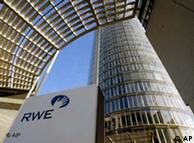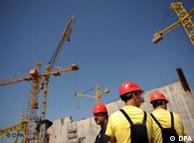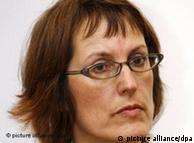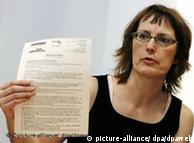Nuclear | 18.01.2011
Small group takes on big business in Germany
Theirs is a David and Goliath story: Eight environmental activists versus some of Germany's largest players in the world of finance and energy.
With little funding and plenty of determination, the organization "Urgewald" serves as a voice of social responsibility on large-scale projects outside Germany's borders.
The woman behind the NGO, Heffa Schücking, has made a name for herself as someone who can hamstring or even block controversial initiatives by simply picking up a phone.
Environmental and international  Bildunterschrift: Großansicht des Bildes mit der Bildunterschrift: Schücking started out studying endangered primates threatened by habitat loss
Bildunterschrift: Großansicht des Bildes mit der Bildunterschrift: Schücking started out studying endangered primates threatened by habitat loss
 Bildunterschrift: Großansicht des Bildes mit der Bildunterschrift: Schücking started out studying endangered primates threatened by habitat loss
Bildunterschrift: Großansicht des Bildes mit der Bildunterschrift: Schücking started out studying endangered primates threatened by habitat lossNow in her early 50s, Schücking got her start studying biology. In the course of her research on primates, she learned that many ape species are threatened with extinction.
"If you look at the situation of primates worldwide, you soon notice that 90 percent of all primate species are endangered because their habitats are being destroyed," she told Deutsche Welle.
In a bid to find out why that was happening, Schücking got in touch with environmental organizations based in the tropics. Their message: Companies and consumer demand in the Northern Hemisphere are often the source of the problem.
Schücking left university without completing her degree - taking her work outside the classroom. She decided to address the problem of endangered primates directly - which eventually led her to cofound Urgewald in 1992.
During the early 1990s, Germany's environmental movement was growing in both size and strength. The number of conservation organizations was exploding - but most focused on domestic environmental problems.
Schücking and her Urgewald colleagues opted for something different. "We wanted to look at what German companies and banks are doing abroad and which environmental and human rights problems they cause there," she said.
 Bildunterschrift: Großansicht des Bildes mit der Bildunterschrift: Urgewald contacted RWE shareholders in a bid to stop the nuclear project in BulgariaUrgewald vs. RWE
Bildunterschrift: Großansicht des Bildes mit der Bildunterschrift: Urgewald contacted RWE shareholders in a bid to stop the nuclear project in BulgariaUrgewald vs. RWE Urgewald made a splash in Germany with a successful campaign against a project spearheaded by the energy giant RWE – one of Europe's five biggest power companies and Germany's second-largest energy provider.
According to Schücking, the firm was planning to fund construction of a new atomic reactor in northern Bulgaria - an area prone to earthquakes.
"A lot of risk factors are involved: a seismic zone; eastern Europe; Bulgaria, the most corrupt land in Europe; and Russian nuclear power plant technology," she said.
But her initial attempts to contact the company didn't get her very far. That is, until Urgewald decided to take the issue directly to RWE's 700 biggest shareholders.
Their letter posed the question: "Do you want to lose your billion-euro investment … through a nuclear catastrophe in an earthquake zone?"
The strategy was effective: "RWE laughed at first, but in the end, it worked … It involved an investment of more than four billion euros … We informed the investors that ultimately, the Belene project would also be a risk for them," Schücking said.
Getting industry's attention  Bildunterschrift: Großansicht des Bildes mit der Bildunterschrift: The Belene nuclear plant was planned in a seismic area in Bulgaria
Bildunterschrift: Großansicht des Bildes mit der Bildunterschrift: The Belene nuclear plant was planned in a seismic area in Bulgaria
 Bildunterschrift: Großansicht des Bildes mit der Bildunterschrift: The Belene nuclear plant was planned in a seismic area in Bulgaria
Bildunterschrift: Großansicht des Bildes mit der Bildunterschrift: The Belene nuclear plant was planned in a seismic area in Bulgaria Schücking acknowledged that not all of the organization's campaigns have been so successful, but Urgewald's work has prompted banks and other large companies to rethink their business principles.
Stefan Löbbert, corporate sustainability manager at Germany's Hypovereinsbank, said his position was created following a heated disagreement involving Urgewald and other NGOs. The organization had criticized the bank's financing of Siemens, who planned to provide turbines for a dam project in India.
"Urgewald and other NGOs in India took up the topic and informed us of the consequences of the dam in India," Löbbert said - adding that most of the trouble stemmed from resettlement challenges.
"After an extensive discussion with Urgewald, we immediately backed out (of the project)," he said. "That's when we realized that we needed different lending standards, which we then implemented."
The dam in India has still not been built and Hypovereinsbank say it is now committed to sustainable management practices.
 Bildunterschrift: Großansicht des Bildes mit der Bildunterschrift: Schücking says she doesn't win every campaign, but even losses serve as deterrentsKeeping the campaigns coming
Bildunterschrift: Großansicht des Bildes mit der Bildunterschrift: Schücking says she doesn't win every campaign, but even losses serve as deterrentsKeeping the campaigns comingUrgewald has a small staff, but the organization has prompted even larger companies to think twice before taking on Schücking and her colleagues.
"I don't want to exaggerate - we don't win every campaign, of course," she said. "But we've seen that the experience for the opponent - a large German company or bank - was so unpleasant that the second time around, they're much more careful or decide to back out altogether."
"Sometimes it just takes a telephone call along the lines of, ‘Do you really want to go through this again?'"
Next up on Schücking's list of projects is making public a list of banks financing Germany's nuclear industry. Even if facing up to nuclear power in Germany will take more than just a phone call, Urgewald's director is confident that the campaign will have an impact.
Author: Jutta Schwengsbier / arp
Editor: Nathan Witkop
Editor: Nathan Witkop
dw


No comments:
Post a Comment